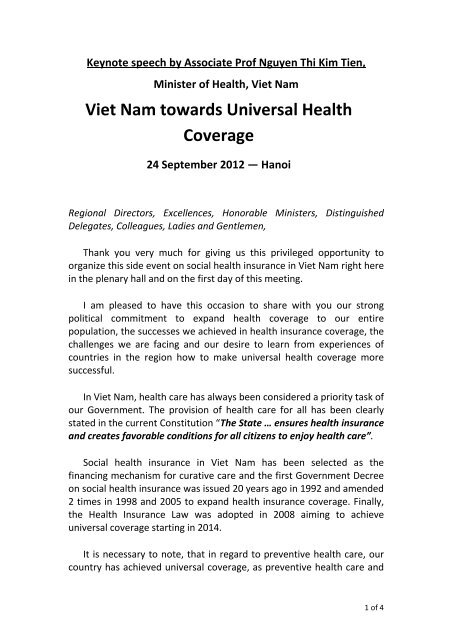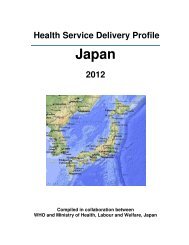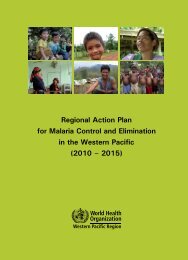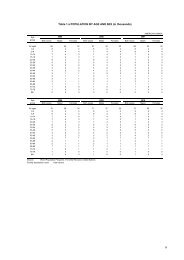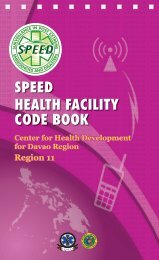Keynote speech by Associate Prof. Nguyen Thi Kim Tien, Health ...
Keynote speech by Associate Prof. Nguyen Thi Kim Tien, Health ...
Keynote speech by Associate Prof. Nguyen Thi Kim Tien, Health ...
- No tags were found...
You also want an ePaper? Increase the reach of your titles
YUMPU automatically turns print PDFs into web optimized ePapers that Google loves.
all public health services are financed <strong>by</strong> the state budget and isprovided for free to the whole population since many years.What our Government additionally wants is access to curative healthcare for every one of our citizens, <strong>by</strong> providing good quality services,based on need, and not on ability to pay. The current financial capacityof the Government does not allow subsidizing health insurancepremiums for all, but the most vulnerable population groups areprioritized in receiving the Government subsidy. The poor, ethnicminorities living in disadvantaged areas, children under six, the elderly,meritorious and social protection groups are fully subsidized to joinhealth insurance. Most of the remaining vulnerable groups, such as thenear poor, school children, and middle income farmers are partlysubsidized to encourage them to enroll in the health insurance scheme.Ladies and Gentlemen,I want to briefly point out our core achievements in terms ofpopulation coverage, services coverage and cost coverage (for details,please see our posters and documents available at the exhibition tablesin the lob<strong>by</strong>).As mentioned before, after 3 years implementing the <strong>Health</strong>Insurance Law, the number of Vietnamese people covered <strong>by</strong> healthinsurance is just over 57 million, equivalent to 64% of the population, ofwhich 14.5 million members are the poor and ethnic minorities, and 8.5million are children under 6 years old.Insured people access health care at all levels of care, from theprimary care level to tertiary hospitals. 74% of visits occurred atcommune health stations and district hospitals, 23% at provincialhospitals and 3% at tertiary hospitals. On average, each insured memberhad 2 outpatient visits and 0.15 hospital admission per year.The health insurance benefit package is designed as a comprehensivepackage, including outpatient and inpatient care, rehabilitation,prescription drugs, and many different health services, including eventhe most advanced such as MRI, CT Scan, hemodialysis, cancertreatment, and cardiac interventions.2 of 4
Out of pocket payment for health has been decreasing significantlyfrom very high levels in the 1990s (80% of total health expenditure) toless than 50% of total health expenditure today.Despite strong political commitment and efforts of all stakeholders,there are still a lot of challenges in achieving universal health coveragefor Viet Nam, a lower middle income country. Just to name the mainchallenges.The first is expanding coverage to the remaining 36% of thepopulation, of which many are employed in the informal sector. We alsoneed to enforce the compliance in the formal sector to increaseparticipation. And we need to learn the best practices on how to selectthe coverage mechanism appropriate for the Vietnamese context, eithera contributory (social health insurance) mechanism with highgovernment subsidy (like China did), or a non – contributory mechanismwith full subsidy from government general revenue (as in Thailand).A further challenge is to improve access to affordable quality healthcare services, through a package of services that has to be developed oncost effectiveness based evidence. To do this we need to develop thecapacity to design these cost–effective based benefit packages, includingthe capacity for health technology assessment.The third challenge is related to the financial protection dimension ofuniversal coverage. We are now revising the <strong>Health</strong> Insurance Law andrelated regulations in order to reduce out of pocket payments for healthservices and to prevent catastrophic health expenditures.Currently, we are in the process of submitting a Master plan foruniversal health insurance coverage to the Government. The Masterplan will be implemented under the instruction of the Prime Ministerwho will be the chair of the Steering Committee with the involvement ofrelevant Ministries such as Ministry of <strong>Health</strong>, Viet Nam Social Security,Ministry of Finance, Ministry of Labor-Invalid and Social Affairs, andMass Organizations such as the Viet Nam Fatherland Front, the TradeUnions, the Women’s Union, the Youth Union, the Farmer Union, etc.3 of 4
Ladies and Gentlemen,I am much encouraged <strong>by</strong> the profound interest and valuablesupport of the WHO/WPRO, especially from the Regional Director, forsocial health insurance development in Viet Nam (just one example isthat he organized with us the high level Tamdao Forum in March 2012,on health insurance policy development and implementation in VietNam). <strong>Thi</strong>s was only one of many activities supported <strong>by</strong> WHO toprovide technical assistance to develop health insurance in Viet Nam. Iwould like to take this occasion to express our thanks to WHO/WPRO, aswell as to the EU, WB, ADB, Rockefeller Foundation, and all the otherswho contribute effectively to the development of health insurance inViet Nam.We would like to suggest that WHO/WPRO enhances its leading rolein organizing activities for the exchange of experiences in healthinsurance implementation, learning lessons of either success or failure inhealth insurance development and for providing continued technicalassistance to member states.I look forward to the establishment of a Western Pacific RegionalNetwork organized <strong>by</strong> WHO/WPRO for exchanging experiences onuniversal health coverage that all member countries can benefit from.We welcome and appreciate any initiative in organizing internationalconferences of countries that are successful in universal coverage toshare their experience.Viet Nam will be actively involved in WHO activities aiming to achieveuniversal health coverage, as we strongly commit to equity in healthcare.I look forward with much anticipation and optimism that my countrycan draw lessons from countries in the region, and we will do ourutmost to achieve universal health coverage so that all people in ourcountry can “enjoy health care” as mandated in our constitution.Thank you very much.4 of 4


